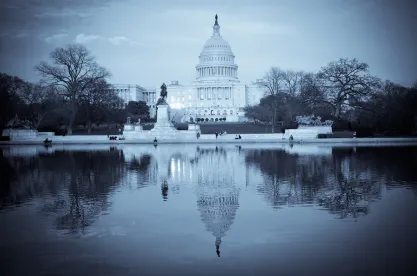Haven’t We Seen This Movie Before? Following the Thanksgiving break, federal legislators have been back in Washington, D.C., this week as the 116th United States Congress—which will likely end on January 3, 2021—sprints toward the finish. Tops on the congressional to-do list is avoiding a government shutdown, which will happen on December 12, 2020, if Congress does not act. (Incidentally, the 35-day record-breaking federal government shutdown that took place between December 2018 and January 2019 began right around this time two years ago—on December 22, 2018.) Of course, with COVID-19 cases spiking and the expiration of the Coronavirus Aid, Relief, and Economic Security (CARES) Act’s unemployment provisions looming, there is yet another push for further economic relief from Congress. Here is how that effort is shaping up.
-
A bipartisan group of senators and representatives recently introduced a compromise stimulus package that would provide $908 billion in funds for unemployment insurance, Paycheck Protection Program (PPP) money, and aid to state and local governments. It also would provide for certain short-term liability protections from COVID-19–related lawsuits to allow states time to come up with their own responses. The bill enjoys the support of Democratic leaders Senator Charles Schumer and Speaker Nancy Pelosi.
-
In the U.S. Senate, however, Republican leaders have their own ideas regarding an appropriate response, which does not bode well for the compromise legislative vehicle. Their proposal is a trimmed-down package with a smaller price tag that is similar to the bill that was twice blocked in the Senate in September and October of this year.
-
The legislative roadblocks appear to be unchanged from what we have seen previously: liability protections (viewed by opponents as harmful to workers and consumers) and money for state and local governments (viewed by opponents as bailouts that might be used to address non-COVID-19–related fiscal matters).
-
That all being said, it appears that the parties are closer than they have been in months to striking a deal. The Buzz will be monitoring the negotiations and will notify you of developments as they happen.
Senate Passes Immigration Bill. On December 2, 2020, the Senate passed by unanimous consent the Fairness for High-Skilled Immigrants Act of 2020 (S. 386 / H.R. 1044). The bill, which would eliminate the per-country caps for employment-based immigrants, passed the U.S. House of Representatives in July 2019 by an overwhelming vote of 365–65. Now, however, Congress must reconcile the existing differences between the two versions of the bill. Accomplishing this, in addition to securing President Donald Trump’s signature, all before the 116th Congress adjourns, will be a challenging task. If this doesn’t happen, the entire legislative process must be restarted in the new Congress.
H-1B Regulations Struck Down. This week, the U.S. District Court for the Northern District of California struck down both the U.S. Department of Homeland Security’s (DHS) H-1B reform rule and the U.S. Department of Labor’s (DOL) prevailing wage rate rule. Brian Bumgardner, Ceridwen Koski, Melissa Manna, and Samantha Wolfe have the details on the decision. The order was issued by U.S. District Judge Jeffrey White, who also recently struck down DHS’s proposed increases to U.S. Citizenship and Immigration Services’ (USCIS) fee schedule, as well as President Trump’s June 22, 2020, proclamation suspending the entry of H-1B, H-2B, J-1, and L-1 visa holders into the United States.
H-1B Wage Prioritization Proposal. December 2, 2020, was the deadline for stakeholders to submit comments in response to USCIS’s proposal to scrap the H-1B lottery in exchange for a process that prioritizes selection of H-1B applicants with the highest promised salaries. An extremely quick review of the comments could result in finalization of the rule prior to January 20, 2021, but whether the rule can become effective within that timeframe is doubtful.
The Last Opinion Letters? This week, the DOL’s Wage and Hour Division (WHD) issued two opinion letters, one dealing with the calculation of the regular rate for employees paid on a piece-rate basis and the other dealing with the agricultural exemption of the Fair Labor Standards Act. With a change in presidential administrations due to take place in just a matter of weeks, could these opinion letters represent the WHD’s final opinion letters, or will there be more to come? Whether it is these two letters or subsequent letters that might issue prior to January 20, 2021, these could be the last opinion letters we see in quite some time, as it very possible that the incoming administration could end or alter the opinion letter process.
Farewell, Senator Alexander. Senator Lamar Alexander (R-TN), who will be retiring at the end of this Congress, gave his farewell speech on the Senate floor this week. Alexander has represented Tennessee in the Senate since 2003, and prior to that served as the U.S. secretary of education, the governor of Tennessee, and the president of the University of Tennessee. As chairman of the U.S. Senate Committee on Health, Education, Labor and Pensions (HELP) since 2015, Alexander has demonstrated a keen understanding of the various labor and employment policy issues facing employers, including fractured bargaining units and joint employment. In 2015, Alexander chaired a hearing of the HELP Committee at which Mark Kisicki testified about the joint-employer issue. On November 3, 2020, Republican Bill Hagerty was elected to represent Tennessee and succeed Alexander in the Senate.




 />i
/>i
